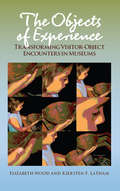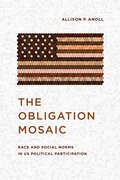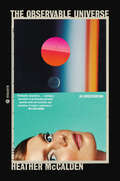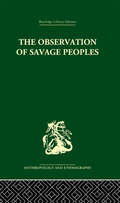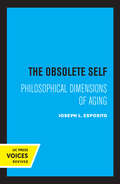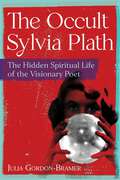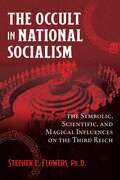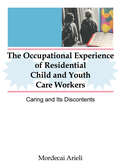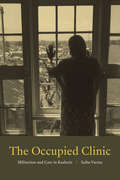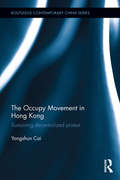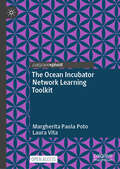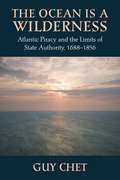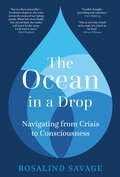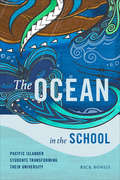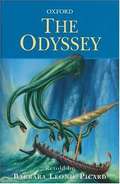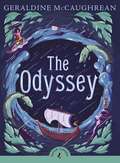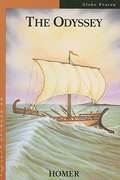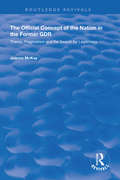- Table View
- List View
The Objects of Experience: Transforming Visitor-Object Encounters in Museums
by Elizabeth Wood Kiersten F LathamWhat if museums could harness the emotional and intellectual connections people have to personal and everyday objects to create richer visitor experiences? In this book, Elizabeth Wood and Kiersten Latham present the Object Knowledge Framework, a tool for using objects to connect museum visitors to themselves, to others, and to their world. They discuss the key concepts underpinning our lived experience of objects and how museums can learn from them. Then they walk readers through concrete methods for transforming visitor-object experiences, including exercises and strategies for teams developing exhibit themes, messages, and content, and participatory experiences.
The Obligation Mosaic: Race and Social Norms in US Political Participation (Chicago Studies in American Politics)
by Allison P. AnollPolitical participation is a costly activity with little clear payoff. And yet, millions of Americans vote, many donate their time and money to campaigns, and even more spend time becoming informed on issues they will have almost no influence over. Even more puzzling, some racial groups, like African Americans, whose members are least obviously able to bear the costs of participation are more likely to engage than other resource-rich groups, like Asian Americans. What explains this? To answer this question, Allison P. Anoll draws on a rich mix of interviews, surveys, and experiments with the four largest racial groups in America to look at the power of social norms in a community, specifically a civic duty norm, as an explanation for the variation in political participation across different racial and ethnic communities. Beliefs about how best to honor the past and help those in need centrally define concepts of obligation, Anoll finds, but whether these feelings of duty connect to politics depends on each group’s distinct history and continued patterns of racial segregation. Her findings offer a thought-provoking explanation for why some people participate in politics and others do not, while also providing a window into opportunities for change, pointing to how traditionally marginalized groups can be mobilized into the political sphere.
The Obligation Mosaic: Race and Social Norms in US Political Participation (Chicago Studies in American Politics)
by Allison P. AnollPolitical participation is a costly activity with little clear payoff. And yet, millions of Americans vote, many donate their time and money to campaigns, and even more spend time becoming informed on issues they will have almost no influence over. Even more puzzling, some racial groups, like African Americans, whose members are least obviously able to bear the costs of participation are more likely to engage than other resource-rich groups, like Asian Americans. What explains this? To answer this question, Allison P. Anoll draws on a rich mix of interviews, surveys, and experiments with the four largest racial groups in America to look at the power of social norms in a community, specifically a civic duty norm, as an explanation for the variation in political participation across different racial and ethnic communities. Beliefs about how best to honor the past and help those in need centrally define concepts of obligation, Anoll finds, but whether these feelings of duty connect to politics depends on each group’s distinct history and continued patterns of racial segregation. Her findings offer a thought-provoking explanation for why some people participate in politics and others do not, while also providing a window into opportunities for change, pointing to how traditionally marginalized groups can be mobilized into the political sphere.
The Obligation Mosaic: Race and Social Norms in US Political Participation (Chicago Studies in American Politics)
by Allison P. AnollPolitical participation is a costly activity with little clear payoff. And yet, millions of Americans vote, many donate their time and money to campaigns, and even more spend time becoming informed on issues they will have almost no influence over. Even more puzzling, some racial groups, like African Americans, whose members are least obviously able to bear the costs of participation are more likely to engage than other resource-rich groups, like Asian Americans. What explains this? To answer this question, Allison P. Anoll draws on a rich mix of interviews, surveys, and experiments with the four largest racial groups in America to look at the power of social norms in a community, specifically a civic duty norm, as an explanation for the variation in political participation across different racial and ethnic communities. Beliefs about how best to honor the past and help those in need centrally define concepts of obligation, Anoll finds, but whether these feelings of duty connect to politics depends on each group’s distinct history and continued patterns of racial segregation. Her findings offer a thought-provoking explanation for why some people participate in politics and others do not, while also providing a window into opportunities for change, pointing to how traditionally marginalized groups can be mobilized into the political sphere.
The Observable Universe: An Investigation
by Heather McCaldenIs anyone ever truly lost in the internet age? A moving, original memoir of a young woman reckoning with her parents&’ absence, the virus that took them, and what it means to search for meaning in a hyperconnected world.&“Brilliantly innovative . . . syncing a narrative of profoundly personal emotion with the invention and evolution of today&’s cyberspace.&”—William Gibson, author of Neuromancer and The PeripheralIn the early 1990s, Heather McCalden lost both her parents to AIDS. She was seven when her father died, ten when she lost her mother. Raised by her grandmother, Nivia, she grew up in Los Angeles, also known as ground zero for the virus and its destruction.Years later, she begins researching online the history of HIV as a way to deal with her loss, which leads her to the unexpected realization that the AIDS crisis and the internet developed on parallel timelines. By accumulating whatever fragments she could about both phenomena—images, anecdotes, and scientific entries—alongside her own personal history, McCalden forms a synaptic journey of what happened to her family, one that leads to an equally unexpected discovery about who her parents might have been.Entwining this personal search with a wider cultural narrative of what the virus and virality mean in our times—interrogating what it means to &“go viral&” in an era of explosive biochemical and virtual contagion—The Observable Universe is at once a history of our viral culture and a prismatic account of grief in the internet age.
The Observation of Savage Peoples
by Joseph-Marie DegerandoAll the major techniques of inquiry which anthropology students now take for granted were first set out in this book. In 1800 Degerando wrote these Considerations on the Various Methods to Follow in the Observation of Savage Peoples as a memoir to serve as guidance to the members of the Societe des Observateurs de l'Homme in an impending expedition to Australia. Degerando's originality lies in his recognizing and stating that the observations of previous explorers were casual and superficial. The advice to the members of the expedition listed topics about which observations should be made and how they should be made. First published in 1969.
The Obsolete Self: Philosophical Dimensions of Aging
by Joseph EspositoThis title is part of UC Press's Voices Revived program, which commemorates University of California Press’s mission to seek out and cultivate the brightest minds and give them voice, reach, and impact. Drawing on a backlist dating to 1893, Voices Revived makes high-quality, peer-reviewed scholarship accessible once again using print-on-demand technology. This title was originally published in 1987.
The Occult Sylvia Plath: The Hidden Spiritual Life of the Visionary Poet
by Julia Gordon-Bramer• Decodes the alchemical, Qabalistic, hermetic, spiritual, and Tarot-related references in many of Plath&’s poems• Based on more than 15 years of research, including analysis of Plath&’s unpublished personal writings from the Plath archives at Indiana University• Examines the influences of Plath&’s parents, her early interests in Hermeticism, and her and husband Ted Hughes&’s explorations in the supernatural and the occultSharing her more than 15 years of compelling research—including analysis of Sylvia Plath&’s unpublished calendars, notebooks, scrapbooks, book annotations, and underlinings as well as published memoirs, biographies, letters, journals, and interviews with Plath and her husband, friends, and family—Plath scholar Julia Gordon-Bramer reveals Sylvia Plath&’s enduring interest and active practice in mysticism and the occult from childhood until her tragic death in 1963. She examines Plath&’s early years growing up in a transcendentalist Unitarian church under a brilliant, if stern, Freemason father and a mother who wrote her master&’s dissertation on the famous alchemist Paracelsus. She reveals Plath&’s early knowledge of Hermeticism, how she devoured books on the occult throughout her life, and how, since adolescence, Plath regularly wrote of premonitory dreams. Examining Plath&’s tumultuous marriage with poet Ted Hughes, she looks at their explorations in the supernatural and Hughes&’s mentoring of Plath in meditation, crystal-gazing, astrology, Qabalah, tarot, automatic writing, magical workings, and use of the Ouija board.Looking at Plath&’s writing and her evolution as a person through mystical, political, personal, and historical lenses, Gordon-Bramer shows how Plath&’s poems take on radically new, surprising, and universal meanings—explaining why Hughes perpetually denied that Plath was a &“confessional poet.&” Contrasting the versions in Letters Home with those held in the Plath archives at Indiana University, the author also shows how all occult influences have been rigorously excised from the letters approved for publication by the Plath and Hughes estates. Revealing previously undiscovered meanings deeply rooted in her mystical and occult endeavors, the author shows how Plath&’s writings are much broader than the narrow lens of her tragic autobiography.
The Occult in National Socialism: The Symbolic, Scientific, and Magical Influences on the Third Reich
by Stephen E. Flowers• Explores the occult influences on various Nazi figures, including Adolf Hitler, Albert Speer, Rudolf Hess, Alfred Rosenberg, and Heinrich Himmler• Examines the foundations of the movement laid in the 19th century and continuing in the early 20th century• Explains the rites and runology of National Socialism, the occult dimensions of Nazi science, and how many of the sensationalist descriptions of Nazi &“Satanic&” practices were initiated by Church propaganda after the warIn this comprehensive examination of Nazi occultism, Stephen E. Flowers, Ph.D., offers a critical history and analysis of the occult and esoteric streams of thought active in the Third Reich and the growth of occult Nazism at work in movements today. Sharing the culmination of five decades of research into primary and secondary sources, many in the original German, Flowers looks at the symbolic, occult, scientific, and magical traditions that became the foundations from which the Nazi movement would grow. He details the influences of Theosophy, Volkism, and the work of the Brothers Grimm as well as the impact of scientific culture of the time. Looking at the early 20th century, he describes the impact of Guido von List, Lanz von Liebenfels, Rudolf von Sebottendorf, Friedrich Hielscher, and others. Examining the period after the Nazi Party was established in 1919, and more especially after it took power in 1933, Flowers explores the occult influences on key Nazi figures, including Adolf Hitler, Albert Speer, Rudolf Hess, and Heinrich Himmler. He analyzes Hitler&’s usually missed references to magical techniques in Mein Kampf, revealing his adoption of occult methods for creating a large body of supporters and shaping the thoughts of the masses. Flowers also explains the rites and runology of National Socialism, the occult dimensions of Nazi science, and the blossoming of Nazi Christianity. Concluding with a look at the modern mythology of Nazi occultism, Flowers critiques postwar Nazi-related literature and unveils the presence of esoteric Nazi myths in modern occult and political circles.
The Occupational Experience of Residential Child and Youth Care Workers: Caring and Its Discontents
by Jerome Beker Mordecai ArieliFrom open and straightforward accounts of residential care workers, The Occupational Experience of Residential Child and Youth Care Workers shows you how care is handled, not how it should be handled. This book introduces you to a social reality, a sometimes very difficult and challenging social reality, as it is viewed by its participants. If you want to know more about what is actually going on in residential care and the discontent that workers frequently experience, this is the book that lays out the facts, the problems, and the nature of residential youth centers.The Occupational Experience of Residential Child and Youth Care Workers broaches the problem of tension between workers and residents and hopes that bringing the problem out into the open will be a first step toward a solution. You learn that the very arrangement of residential care automatically sets up antagonism between the sole group care worker and his/her wards; residents tend to resist the inherently coercive efforts of the worker who tries to bring them through processes of change and socialization. The Occupational Experience of Residential Child and Youth Care Workers will make you think about: residential care and conflicts group interaction career satisfaction and dissatisfaction interpretive sociology of education and its methodology social controlInterviews with Israeli residential care workers are presented to help you understand the circumstances under which residential care providers experience discontent, or job dissatisfaction. You learn which workers are most likely to feel discontented and how staff members cope with the stress and discontent they experience. Youth care workers, policymakers, child-care staff recruiters, supervisors, and trainers will find this book sheds much light on the problem of discontent and the need to make child and youth care facilities more humane for residents and staff alike. It will also help social work educators and researchers in sociology, social work, and the social psychology of education get in touch with what goes on inside the walls of residential care centers.
The Occupied Clinic: Militarism and Care in Kashmir
by Saiba VarmaIn The Occupied Clinic, Saiba Varma explores the psychological, ontological, and political entanglements between medicine and violence in Indian-controlled Kashmir—the world's most densely militarized place. Into a long history of occupations, insurgencies, suppressions, natural disasters, and a crisis of public health infrastructure come interventions in human distress, especially those of doctors and humanitarians, who struggle against an epidemic: more than sixty percent of the civilian population suffers from depression, anxiety, PTSD, or acute stress. Drawing on encounters between medical providers and patients in an array of settings, Varma reveals how colonization is embodied and how overlapping state practices of care and violence create disorienting worlds for doctors and patients alike. Varma shows how occupation creates worlds of disrupted meaning in which clinical life is connected to political disorder, subverting biomedical neutrality, ethics, and processes of care in profound ways. By highlighting the imbrications between humanitarianism and militarism and between care and violence, Varma theorizes care not as a redemptive practice, but as a fraught sphere of action that is never quite what it seems.
The Occupy Movement in Hong Kong: Sustaining Decentralized Protest (Routledge Contemporary China Series)
by Yongshun CaiThe Occupy movement in Hong Kong was sustained for about 80 days because of government tolerance, the presence of determined participants, and a weak leadership. The government tolerated the occupation because its initial use of force, in particular teargas, was counterproductive and provoked large-scale participation. Unlike other social movements, such as the 1989 Tiananmen movement, the Occupy movement reached its peak of participation at the very beginning, making it difficult to sustain the momentum. The presence of determined participants who chose to stay until the government responded was crucial to the sustaining of the movement. These self-selected participants were caught in a dilemma between fruitless occupation and reluctance to retreat without a success. The movement lasted also because the weak leadership was unable to force the government to concede or devise approaches for making a "graceful exit." Consequently, site clearance became the common choice of both the government and the protestors. This book develops a new framework to explain the sustaining of decentralized protest in the absence of strong movement organizations and leadership. Sustained protests are worth research because they not only reveal the broad social context in which the protests arise and persist but also point out the dynamics of the escalation or the decline of the protests. In addition, sustained protest may not only lead to more dramatic action, but they also result in the diffusion of protests or lead to significant policy changes.
The Occupy Movement in Hong Kong: Sustaining Decentralized Protest (Routledge Contemporary China Series)
by Yongshun CaiThe Occupy movement in Hong Kong was sustained for about 80 days because of government tolerance, the presence of determined participants, and a weak leadership. The government tolerated the occupation because its initial use of force, in particular teargas, was counterproductive and provoked large-scale participation. Unlike other social movements, such as the 1989 Tiananmen movement, the Occupy movement reached its peak of participation at the very beginning, making it difficult to sustain the momentum. The presence of determined participants who chose to stay until the government responded was crucial to the sustaining of the movement. These self-selected participants were caught in a dilemma between fruitless occupation and reluctance to retreat without a success. The movement lasted also because the weak leadership was unable to force the government to concede or devise approaches for making a "graceful exit." Consequently, site clearance became the common choice of both the government and the protestors.This book develops a new framework to explain the sustaining of decentralized protest in the absence of strong movement organizations and leadership. Sustained protests are worth research because they not only reveal the broad social context in which the protests arise and persist but also point out the dynamics of the escalation or the decline of the protests. In addition, sustained protest may not only lead to more dramatic action, but they also result in the diffusion of protests or lead to significant policy changes.
The Ocean Incubator Network Learning Toolkit
by Margherita Paola Poto Laura VitaThis open access book is designed to enhance ocean literacy through diverse research, educational and interdisciplinary approaches. It focuses on a number of critical themes, including: an exploration of positionality, emphasizing the importance of acknowledging one’s own perspective in ocean-related research and advocacy; the nuances of trans-cross and interdisciplinarity in ocean studies, advocating for a systemic approach to understanding oceanic phenomena; a model for collaborative research and project development methods. The authors also include practical components such as a mapping of student-led projects on Ocean Literacy and a chapter dedicated to activities that can be implemented to promote understanding and engagement with oceanic themes. This part is designed to be directly applicable in educational settings, providing tools and ideas for active learning. The book is enriched with a vast array of references, resources, infographics, and mind maps to support the content visually and intellectually. Additionally, to ensure accessibility and enhance learning experiences, a video and audio version of the book will be available via a QR code, making this resource fully accessible to a broad audience, including those with visual and auditory impairments. This toolkit serves as a comprehensive guide for educators and researchers and is a pivotal resource for anyone committed to advancing ocean literacy. This Open Access Book is endorsed by the United Nations Decade of Ocean Science for Sustainable Development as a Decade Activity.
The Ocean Is A Wilderness: Atlantic Piracy And The Limits of State Authority, 1688-1856
by Guy ChetHistorians have long maintained that the rise of the British empire brought an end to the great age of piracy, turning the once violent Atlantic frontier into a locus of orderly commerce by 1730. In this book, Guy Chet reassesses that view by documenting the persistence of piracy, smuggling, and other forms of illegal trade throughout the eighteenth century despite ongoing governmental campaigns to stamp it out. the failure of the Royal Navy to police oceanic trade reflected the state's limited authority and legitimacy at port, in the courts, and in the hearts and minds of Anglo-American constituents. Chet shows how the traditional focus on the growth of the modern state overlooked the extent to which old attitudes and cultural practises continued to hold sway. Even as the British government extended its naval, legal, and bureaucratic reach, in many parts of the Atlantic world illegal trade was not only tolerated but encouraged. In part this was because Britain's constabulary command of the region remained more tenuous than some have suggested, and in part because maritime insurance and wartime tax policies ensured that piracy and smuggling remained profitable. When Atlantic piracy eventually waned in the early nineteenth century, it had more to do with a reduction in its profitability at port than with forceful confrontation at sea. Challenging traditional accounts that chronicle forces of civilization taming a wild Atlantic frontier, this book is a valuable addition to a body of borderlands scholarship reevaluating the relationship between the emerging modern state and its imperial frontiers.
The Ocean in a Drop
by Arjun Shekhar Kamini Prakash Meenu Venkateswaran Ashraf PatelThe Ocean in a Drop explores how young people have contributed significantly to society in the past, and suggests ways in which they can take centre stage again. Traditionally, society has legitimized four spaces for young people: the family, friends, education/careers, and leisure. The book introduces the concept of the 5th Space--a space that goes beyond the commonly used terms of volunteerism and Active Citizenship and focuses on three critical aspects of youth development: understanding the Self, building meaningful relationships, and impacting Society. By facilitating young people to connect their selves with society and by developing skills, values, and attitudes that enable them to impact the world around them, 5th Spaces become a critical strategy for renewing society. From the lessons learnt from the Indian Independence movement, theories of youthhood, interviews with key stakeholders, and Pravah's own experiences of working with young people, the book argues that youth once again need to be at the forefront of nation building.
The Ocean in a Drop: Navigating from Crisis to Consciousness
by Roz SavageThe bad news is that our civilisation is collapsing. The good news is that you are already helping create a new and better one.The Ocean in a Drop follows the quest of Roz Savage, a frustrated environmentalist and ocean adventurer, to find out why her own endeavours and the environmental movement more generally have failed to achieve change of the necessary scope, scale and speed. Her journey takes her from the environment through economics and politics into patriarchy and a global culture of domination – the domination of rich over poor, strong over weak, humanity over nature. She examines the tragic psychological flaws in the way we think, and the apparent inevitability of civilisational collapse, and deduces that our best hope is to transcend the current trap of runaway materialism. But how?Exploring cutting-edge theories on the nature of reality and the relationship between matter and consciousness, she peels back the veils of our shared delusions to arrive at a new narrative about what it means to be human in the twenty-first century. She paints a bold, exciting vision of a future in which people and planet thrive.
The Ocean in the School: Pacific Islander Students Transforming Their University
by Rick BonusIn The Ocean in the School Rick Bonus tells the stories of Pacific Islander students as they and their allies struggled to transform a university they believed did not value their presence. Drawing on dozens of interviews with students he taught, advised, and mentored between 2004 and 2018 at the University of Washington, Bonus outlines how, despite the university's promotion of diversity and student success programs, these students often did not find their education to be meaningful, leading some to leave the university. As these students note, they weren't failing school; the school was failing them. Bonus shows how students employed the ocean as a metaphor as a way to foster community and to transform the university into a space that valued meaningfulness, respect, and critical thinking. In sharing these students' insights and experiences, Bonus opens up questions about measuring student success, the centrality of antiracism and social justice to structurally reshaping universities, and the purpose of higher education.
The Odyssey
by Homer Barbara Leonie PicardAfter the fall of Troy, Odysseus sets sail for his island kingdom of Ithaca, but has to face many dangers and even travels to the underworld, meeting dead Greek heroes. [This text is listed as an example that meets Common Core Standards in English language arts in grades 6-8 at http://www.corestandards.org.]
The Odyssey
by Homer Geraldine MccaughreanThis book describes the epic journey of Odysseus, the hero of Ancient Greece...After ten years of war, Odysseus turns his back on Troy and sets sail for home. But his voyage takes another ten years and he must face many dangers - Polyphemus the greedy one-eyed giant, Scylla the six-headed sea monster and even the wrath of the gods themselves - before he is reunited with his wife and son.
The Odyssey of Homer ( An Adapted Classic)
by Homer Henry I. ChristHomer's great epic describes the many adventures of Odysseus, Greek warrior, as he strives over many years to return to his home island of Ithaca after the Trojan War. His colorful adventures, his endurance, his love for his wife and son have the same power to move and inspire readers today as they did in Archaic Greece, 2800 years ago.
The Odyssey: The Story of Odysseus
by Homer W. H. D. RouseThe story of a Greek legend Odysseus and his adventures on his way home from Troy.
The Official ACT Prep Guide
by Jossey-Bass StaffEverything you need to know about the 2016-2017 ACT test, with real full-length practice tests from the makers of the ACT! The Official ACT Prep Guide 2016-2017 is the bestselling resource for students gearing up for the ACT test. This comprehensive guide walks you through the entire test experience, from registration through results, with expert advice straight from the test's creators. You'll find effective test-taking strategies, tips for boosting your score on the English, math, reading, and science tests, and detailed information on the enhanced optional writing test. Three new full-length practice tests help you assess your readiness so you can spot weak areas well in advance, and the ACT experts provide valuable advice on preparing both mentally and physically so you can manage anxiety and be fully confident on test day. You also get free online bonus content to help you start college on the right foot, including tips for preparing an application that gets noticed, getting into your first-choice school, being a successful student, and much more. The 2016-2017 version of the ACT guide includes a number of changes, including reading test sections with two shorter prose passages and the enhanced writing test's prompts. This guide provides a preview of what to expect for the entire exam, so you can go into the test feeling fully prepared and ready to excel.
The Official Concept of the Nation in the Former GDR: Theory, Pragmatism and the Search for Legitimacy (Routledge Revivals)
by Joanna McKayFirst published in 1998, this volume joined the effort to understand the former German Democratic Republic, with the aim of reaching a better understanding of the psychologically painful process of German reunification following the collapse of East-German communism in 1989. While born illegitimate and artificial, the country determined the lives of millions of people, despite having now disappeared from the map. This study from Joanna McKay incorporates previously unavailable archive material and focuses on some of the most challenging, ever-present tasks for the GDR leaders. In particular, she examines how they approached explaining the division with West Germany without undermining the legitimacy of the GDR.
The Official Dopamine Nation Workbook: A Practical Guide to Overcoming Addiction in the Age of Indulgence
by Dr Anna LembkeA practical companion to the international bestseller Dopamine Nation, for individuals, families, counsellors, teachers, and anyone who wants to go beyond the narrative and engage in practices that will reset reward pathways for a more flourishing life.In Dopamine Nation, Dr. Lembke introduced readers to her ground-breaking research that demonstrates how abundance itself is a stressor, contributing to rising rates of addiction, depression, and anxiety. Now, she's written the workbook that we've all been waiting for. Full of specific exercises, fill-in tables, and inspiring examples, readers will be able to more clearly identify the substances and behaviors they struggle to moderate. With the warm, authoritative voice we know and love, Dr. Lembke will share her valuable advice on how to undertake your own dopamine fast, reset your own pathways, and live a happier and more fulfilling life.Praise for Dopamine Nation:'Anna Lembke's stories of guiding people to find a healthy balance between pleasure and pain have the power to transform your life' - Lori Gottlieb, bestselling author of Maybe You Should Talk to Someone'Brilliant . . . riveting, scary, cogent, and cleverly argued. Lembke weaves patient stories with research, in a voice that's as empathetic as it is clear-eyed' - Beth Macy, bestselling author of Dopesick'Radically changes the way we think about mental illness, pleasure, pain, reward, and stress. Turn toward it. You'll be happy you did' - Daniel Levitin, bestselling author of The Organized Mind
